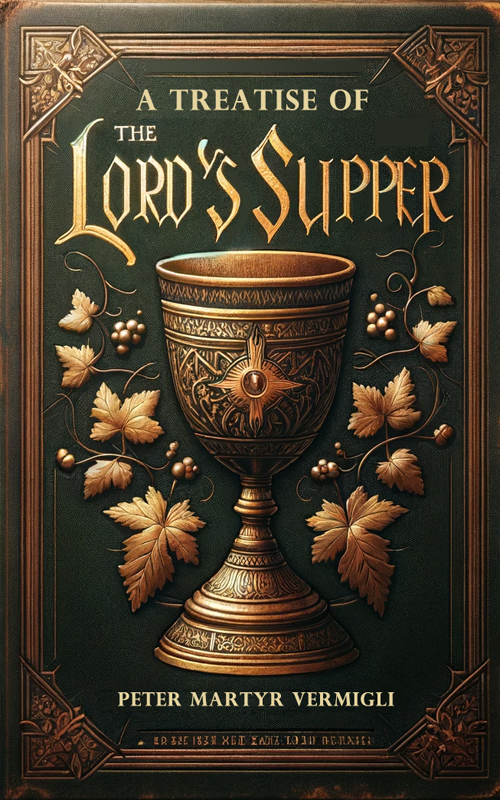 by Peter Martyr Vermigli
by Peter Martyr Vermigli
in ePub, .mobi & .pdf formats
"A Treatise of the Lord’s Supper" by Peter Martyr Vermigli is an essential read for anyone interested in the theological intricacies of the Eucharist and its role in Christian worship.
Vermigli opens with a clear and structured approach to the contentious debates surrounding the Eucharist. He outlines four principal points: transubstantiation, the retention of bread and wine's true nature, the symbolic representation of Christ's body and blood, and the godliness inherent in these views. This structured approach makes complex theological debates accessible and engaging.
Vermigli emphasizes the authority of Holy Scripture in understanding the Eucharist. He meticulously analyzes key biblical passages, such as John 6 and the synoptic Gospel accounts of the Last Supper, to argue against the literalist interpretation of transubstantiation. His thorough exegesis helps readers appreciate the depth of scriptural support for a Reformed understanding of the sacrament.
The treatise considers the teachings of the early Church Fathers, including Augustine, Irenaeus, and Chrysostom, providing a historical context that supports Vermigli's arguments. By highlighting the continuity of Reformed sacramentatl theology with early Christian thought, Vermigli demonstrates the robust historical foundation of his views.
Throughout the treatise, Vermigli addresses various theological arguments against transubstantiation, including the logical inconsistencies and metaphysical issues it presents. He also discusses the spiritual benefits of the Eucharist, arguing that a symbolic understanding does not diminish its efficacy but rather enhances the believer’s spiritual experience.
Vermigli does not shy away from critiquing opposing views, particularly those of the Roman Catholic Church. He examines the implications of transubstantiation for Christology and soteriology, making a compelling case for why the Reformed perspective offers a more coherent and scripturally faithful understanding of the Lord's Supper.
The treatise also touches on the practical implications of Eucharistic theology for worship and piety. Vermigli encourages believers to approach the sacrament with reverence and faith, emphasizing the importance of understanding its symbolic significance in fostering a deeper communion with Christ.
Conclusion
"A Treatise of the Lord’s Supper" by Peter Martyr Vermigli is a masterful work that combines rigorous theological analysis with a deep reverence for the sacrament. It is a must-read for theologians, pastors, and laypeople alike who seek a comprehensive and historically grounded understanding of the Eucharist. Vermigli’s eloquent prose and incisive arguments make this book not only an academic resource but also a devotional aid that enriches the reader’s spiritual journey.
-----
Table of Contents
Introduction
Chapter 1: The Persuasion of Holy Scripture
Chapter 2: Propositions and Interpretations
Chapter 3: The Present Tense and Substance
Chapter 4: The Fathers and Councils
Chapter 5: The Consent of the Church & The Arguments from the Power of God and Miracles
Chapter 6: The Faith of the Church and Idolatry
Chapter 7: The Arguments Against Transubstantiation
Chapter 8: Scriptural Changes and Figures
Chapter 9: The Apostle and Bread
Chapter 10: Arguments from the Old Fathers and Sacraments
Chapter 11: The New and Old Sacraments
Chapter 12: Substance of Sacraments
Chapter 13: Baptism and Eucharist
Chapter 14: The Marcionites and Heresy
Chapter 15: The Nature of a Sacrament
Chapter 16: The Inexplicable Absurdities of Transubstantiation
Chapter 17: The Inconveniences of Transubstantiation
Chapter 18: The Joining of Christ's Body with the Signs
Chapter 19: Baptism and the Eucharist
Chapter 20: Spiritual Eating and the Sixth Chapter of John
Chapter 21: The Fellowship of Saints and Transubstantiation
Chapter 22: The Division of the Sacrament
Chapter 23: The Continuation of the Sacrament
Chapter 24: The Humility and Submission of Christ
Chapter 25: The Nature of the Sacrifice
Chapter 26: The Contradictions of Transubstantiation
Chapter 27: The Mystical Body
Chapter 28: The Role of Miracles
Chapter 29: The Testimonies of the Fathers
Chapter 30: The Mystical Distribution and Spiritual Food
Chapter 31: Chrysostom and the Nature of the Eucharist
Chapter 32: Confuting the Arguments for Transubstantiation
Chapter 33: Understanding the Sacramental Language
Chapter 34: Understanding Figurative Language in Sacramental Context
Chapter 35: The Dignity of Christ and the Substance of Bread
Chapter 36: Chrysostom's Teachings on the Sacrament
Chapter 37: Augustine's Position on the Eucharist
Chapter 38: On the Worship of Images and Eucharistic Practices
Chapter 39: Hilary's Arguments Against the Arians
Chapter 40: Examination of Theophylact
Chapter 41: The Unity and Substance of the Eucharist
Chapter 42: Cyril and the Council of Ephesus
Chapter 43: The Synod of Constance and Transubstantiation
Chapter 44: Argument of the Glorified Body and the Presence of Christ
Chapter 45: Argument from the Nature of Sacraments
Chapter 46: The Force and Efficacy of the Word of God
Chapter 47: The Body of Christ and its Omnipresence
Chapter 48: The Arguments Against the Gross Judgement
Chapter 49: Augustine's Teachings on the Presence of Christ
Chapter 50: Fulgentius on Christ's Presence
Chapter 51: The Third Opinion on Christ's Presence
Chapter 52: Evaluating the Opinions on Christ's Presence
